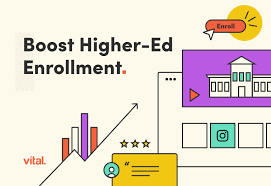
In today’s fast-paced, globalized world, higher education has become more than just a stepping stone to a career; it is a gateway to personal growth, social mobility, and the development of critical skills that are essential for success in nearly every field. As the demand for knowledge and expertise continues to grow, the role of higher education in shaping the future of individuals, communities, and societies has never been more significant.
What is Higher Education?
Higher education refers to the academic programs and courses offered by colleges, universities, and other post-secondary institutions. It typically follows the completion of secondary education (high school) and includes undergraduate and postgraduate programs, such as associate’s degrees, bachelor’s degrees, master’s degrees, and doctoral degrees.
Unlike primary or secondary education, which provides foundational knowledge and skills, higher education is often specialized, allowing students to dive deeper into specific areas of study. This advanced education equips students with the expertise and qualifications needed to excel in their chosen fields.
Why Higher Education Matters
Career Opportunities and Earning Potential
One of the most well-known benefits of higher education is its impact on career prospects. Graduates with degrees generally have access to a wider range of job opportunities, particularly in specialized fields such as medicine, law, engineering, business, and technology. Higher education can also significantly increase earning potential. According to studies, individuals with a bachelor’s degree typically earn more than those with only a high school diploma, and those with advanced degrees can earn even more.
Furthermore, higher education equips graduates with critical thinking, problem-solving, and communication skills that are highly valued by employers across industries. These skills are transferable and can open doors to leadership positions and entrepreneurial ventures.
Personal Growth and Development
While higher education is often associated with career preparation, it also plays a crucial role in personal development. College and university life offers a unique environment for self-discovery, fostering independence, resilience, and self-discipline. Students are exposed to diverse ideas, cultures, and perspectives, which broadens their worldview and enhances their emotional intelligence.
Moreover, higher education often encourages students to explore their passions, challenge their assumptions, and engage in meaningful intellectual debates. These experiences not only help students build a strong academic foundation but also foster qualities such as curiosity, creativity, and adaptability—skills that are invaluable in both professional and personal contexts.
Social and Economic Mobility
Higher education serves as a powerful tool for social mobility. By providing individuals from various socioeconomic backgrounds the opportunity to acquire advanced knowledge and skills, higher education helps bridge the gap between different social classes. It opens up opportunities for better jobs, improved living standards, and access to social networks that might otherwise be out of reach.
For many, earning a degree is a way to break the cycle of poverty and create a better future for themselves and their families. Studies have shown that higher education can reduce income inequality and promote economic growth by creating a more educated workforce.
Contributing to Society
Beyond personal and economic benefits, higher education also plays a vital role in the broader societal context. Universities and colleges are centers of research and innovation, where breakthroughs in science, technology, medicine, and the arts are made. These advancements not only improve lives but also drive economic growth and solve pressing global challenges, from climate change to healthcare.
Moreover, higher education fosters civic engagement and a sense of responsibility. College graduates are more likely to vote, volunteer, and contribute to their communities. Through their education, they learn about history, ethics, social justice, and global issues, which empowers them to be informed and active citizens.
Choosing the Right Path in Higher Education
With so many options available, choosing the right higher education path can be daunting. Whether you’re considering a traditional four-year university, a community college, or a technical school, it’s important to think about your long-term goals, career aspirations, and personal interests.
Here are a few factors to consider when choosing a higher education institution:
Program Specialization: Look for programs that align with your career goals and interests. Consider whether a university offers the specific degree or major you’re passionate about.
Accreditation: Ensure that the institution is accredited by a recognized agency. Accreditation ensures that the school meets certain academic standards and that your degree will be respected by employers and other institutions.
Cost and Financial Aid: Higher education can be expensive, but there are many ways to make it more affordable. Look into scholarships, grants, and loan options, and consider the potential return on investment based on your expected career outcomes.
Location and Campus Life: Consider the location of the institution, the size of the campus, the available extracurricular activities, and the overall atmosphere. These factors can contribute to your personal growth and overall college experience.
The Future of Higher Education
As technology and society continue to evolve, higher education is also adapting to meet the needs of the modern world. Online learning, for instance, has become increasingly popular, offering flexibility for students who may not be able to attend traditional brick-and-mortar institutions. This digital transformation has opened up educational opportunities to a global audience, allowing individuals from different countries and backgrounds to access quality education.
Additionally, there is a growing emphasis on lifelong learning. As industries continue to evolve and new technologies emerge, the need for ongoing education and skills development is more important than ever. Higher education is no longer seen as a one-time event, but rather as an ongoing process that supports personal and professional growth throughout an individual’s career.
Conclusion
Higher education is a powerful tool for personal and professional development, offering individuals the chance to gain valuable skills, broaden their perspectives, and contribute to society. Whether you’re pursuing a degree to launch your career, enhance your knowledge, or simply to grow as a person, the opportunities that higher education provides are vast and transformative. By investing in higher education, you are not only investing in your own future but also in the future of your community and the world at large.
Understanding the Cost of Secondary and Higher Education Diplomas and Steps to Obtain Them
